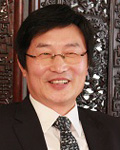|
 |
|
(CFP) |

My daughter, who is now studying for her master's degree at Japan's Waseda University, always asks me: most people I meet in Japan are quite amiable, and Prime Minister Abe Shinzo is liked by the Japanese people, so why does China accuse Japan of deviating to the right? Shigeru Ishiba, Secretary General of the Liberal Democratic Party of Japan, who used to be Japan's defense minister, also posed a question to me during a China-Japan think-tank forum: After World War II, Japan has been on a peaceful road for decades, so why does China always say that Japan's militarism is experiencing a revival? Soichiro Tahara, a well-known TV host in Japan, asked me the same question: the friendly relationship between China and Japan has withstood many trials and tribulations, but is the relationship beginning to falter now?
Japan's shift to the right is not something created by China, but it is embodied by Japan's behavior. When I went to work in Osaka 25 years ago, some right-wing Japanese made trouble in front of the Chinese Consulate General. As the Office Director for the consulate at that time, I often met the local government and police and sometimes I talked directly with the leaders of the right wing. In my opinion, the right wing acted in a restrained manner at that time and was isolated, regarded as spread out and divided by the Japanese public. But the right-wing movement in Japan today is much more organized and vocal. They are no longer satisfied with non-violent moves. What's even worse is that in recent years some ordinary people have participated in the right-wing activities. I wonder whether this is because the right wing has won more sympathy and support, or because the Japanese nation needs to find an outlet to release emotions pent up after years' of a sluggish economy.
Let's look at the Japanese media—Not to mention the consistently right-leaning Sankei Shimbun, even Yomiuri Shimbun and NHK, which have long labeled themselves as neutral, tend to publish some radical opinions, or make nods toward extreme right-wing politicians and scholars, allowing them to use these media outlets to publish their radical view. A Japanese journalist, who in my eyes is quite right-leaning, surprised me by telling me that he was criticized by his colleagues in Japan for his outdated practice of being intimate with China.
Now, let's discuss Japanese politicians. In the past, leaders who were seen as having made inappropriate speeches would resign over the remarks that may cause diplomatic disputes, but today they often win support from the public by problematic remarks or acts. As for the history textbook issue, the rate of adopting those textbooks containing contents that beautify Japan's aggressive war against other countries has increased, despite the increasing criticism from the international community. When a country's right-wing prime minister, its right-wing communities, and its right-wing textbooks become increasingly popular, can you still think this country is not shifting to the right?
As for whether militarism is experiencing a revival in Japan, I don't want to go deep into recent aggressive military offensives conducted by the country. I only want to repeat an example I mentioned in an open discussion on TV. I used to give support to Li Ying, a young Chinese director in Japan. He spent 10 years producing a documentary called Yasukuni. Later, I wrote a preface for his book of the same name. The book is very popular in China. Although the documentary experienced a backlash in Japan from nationalists, who put pressure on cinemas to stop them from screening the movie, it won awards at international movie festivals. Its success does not lie in the revelation and criticism it depicts, but because the materials related to Yasukuni Shrine are inspiring.
A young Japanese man told me after watching this documentary that he had never been to the Yasukuni Shrine and he did not understand why China and South Korea refuse to forgive Japan over the issue. However, after watching the documentary, the spirit of war embodied in aggressive old military men in uniform, and the misleading commentary presented at Yasukuni Museum, he felt deep shame and understood the terror of war. He said that he understood why so many foreigners don't understand Japan, and also that even the Japanese think that such things are unacceptable. It is hoped that Japanese politicians visiting Yasukuni Shrine will also watch this movie carefully.
During the five years when I was the spokesman for the Chinese Embassy in Japan, I witnessed Japan's then Prime Minister Junichiro Koizumi's six visits to the Yasukuni Shrine. Ever since the 14 class-A war criminals were enshrined there in 1978, the shrine has become a place that should be avoided by Japanese politicians. As far as I know, some of these war criminals' families don't want politicians to visit the shine either. As a Chinese saying goes, "a burnt child dreads the fire." Connecting Japan's history of invasion with what Japanese leaders are doing today, people can hardly believe that a right-wing prime minister would pray for peace when they visit the shrine that honors class-A war criminals. Furthermore, considering the Japanese authority's constitution amendment and also the passing of the Special Secrets Protection Bill, it's no wonder that the countries that were victims of Japan's war crimes have begun to worry about the revival of militarism in the country.
Now, I will answer the question posed by Soichiro Tahara, the Japanese journalist: Is the relationship between Japan and China beginning to falter now, even after years of being amicable? The China-Japan relationship has managed to develop based on their political foundations, emotional bonds and common interests. But now the political foundation is often destroyed by some people, particularly leaders like the prime minister. The emotional bond is often deliberately hurt or even broken too. Then how to safeguard the common interests of the two countries? We are not afraid of small troubles in the bilateral relationship, but we don't want to see deliberately produced problems, particularly those concerning China's core interests as well as the political foundation of the two countries. When Abe took office in December 26, 2012, I published articles in Chinese publications forecasting that Abe's taking office may be the opening of Pandora's box. One year later, Abe's actions proved that such worries are not groundless. At that time, I gave suggestions to the Japanese prime minister: first, not to take risks in territorial issues; second, not to take a long shot gamble on the issue of a Yasukuni Shrine visit; third, not to isolate itself from its neighbors. I knew Abe would not listen to me, though he let others tell me that he had already read my articles. However, he should at least listen to the voices from his own country and from the international community, and he should also take the future of the Japanese people into consideration.
Actually, I myself also have a question for Abe: for a prime minister, visiting the Yasukuni Shrine is a violation of the principle of separation of church and state in Japan, and an action that tarnishes Japan's image in the eyes of not only China and South Korea, but also the United States. Does he think he can disregard all these countries in the name of his own interests? Can the international community feel at ease with a Japan that is led by a right-wing prime minister and is seeking to play a bigger role on the international stage?
The author formerly worked at the Chinese Embassy in Japan and is currently Chinese Ambassador to Trinidad and Tobago |
